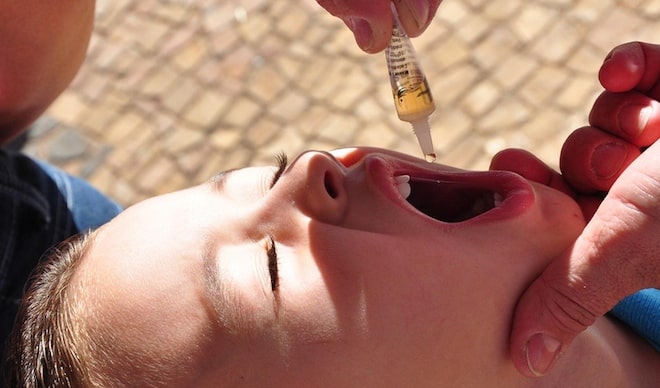
Image: André Luiz D. Takahashi (CC), Flickr
In a move that is simultaneously discouraging, urgent and deeply unusual, the World Health Organization has declared that the resurgence of polio is a “public health emergency of international concern.” It’s an extraordinary statement, coming less than four months after India — once considered a place where polio might never be vanquished — was declared polio-free after three years without a new case.
That achievement left only Afghanistan, Nigeria and Pakistan as countries where the chain of polio transmission had never been broken. But as the virus persists in those countries, it is also moving out across their borders. Seven other nations that previously had beaten polio — Cameroon, Equatorial Guinea, Ethiopia, Iraq, Israel, Somalia and Syria — have now been reinfected, and the virus is spreading in communities there.
If the continued existence of polio is news to you, you’re not alone. It’s a largely forgotten disease in the industrialized West; the last United States case occurred in 1979. The WHO, the Centers for Disease Control and Prevention, the fraternal organization Rotary International and a raft of partners have been pressing an international and very expensive eradication campaign since 1988. Every time the world has gotten close, though, polio has flared up again. The WHO once thought it would be able to declare the disease eradicated in 2000; then it set 2005 as a target; then 2008; 2012; 2015; and now, a hoped-for 2018. (Here’s my archive of posts.)
But the past couple of months have thrown even that into doubt. The trigger for the WHO’s action was the discovery that there have been 74 cases of polio so far this year. That seems like a low number, but there were only 417 in all of 2013. And, crucially, winter is considered polio’s “low season” — so for polio to be spreading now rings an alarm bell for the warmer, wetter months when it usually spreads faster and further.
In the current polio hot spots — notably Pakistan, which has 59 of this year’s 74 cases, and Syria, where the disease rebounded in 2013 with incredible speed — civil war is keeping immunizations from reaching vulnerable children. (In Pakistan, appalling US intelligence decisions played a role too.) The WHO is clearly concerned that further spread could seed the virus into other countries suffering internal unrest.
“The consequences of further international spread are particularly acute today given the large number of polio-free but conflict-torn and fragile states which have severely compromised routine immunisation services and are particularly at high risk of infection,” Dr. Bruce Aylward, the WHO’s assistant director-general in charge of polio, said in a media briefing Monday. “These states will have extreme difficulty in mounting an effective response should they become re-infected.”
Polio largely affects children, crippling them when it does not kill them outright, but Aylward said research into the current emergency demonstrates that the virus is being transported across borders by adults who are carrying it but not affected by it. To suppress that inadvertent importation, the WHO is making a strong demand of countries with local epidemics, under the international compact called the IHRs (for International Health Regulations). The demands, phrased as “emergency recommendations,” are posted here, but the substance is:
- Pakistan, Cameroon and Syria, the three countries known to be exporting virus right now, are expected to guarantee that anyone traveling out of the country be re-vaccinated from 4 to 12 months before leaving; if travelers have not, that they should be vaccinated by the time they depart, even if that means in the airport; and that travelers carry a document testifying to their vaccination status.
- The countries where virus is known to be circulating, but which have not been shown to have infected other countries this year (Afghanistan, Equatorial Guinea, Ethiopia, Iraq, Israel, Nigeria and Somalia) are expected to encourage travelers to be vaccinated (as opposed to “ensure,” the WHO’s actual language for the other three) and to carry proof that vaccination take place.
- Both countries are expected to keep this up until transmission of polio stops within their borders, and for at least six months after that.
These are unusually tough recommendations from the WHO, especially given that it has no power to force countries to act, but relies on governments’ consciousness of their international standing — and also given that the IHRs which make possible these demands also compel the agency to minimize impact on travel and trade. There’s an implicit sense that the situation is really urgent. Aylward said:
It will be a decision of the countries themselves as to how they want to handle their departing travellers and how quickly they will be able to ensure documentation…That may take a few days to get the policy sorted out in the country and then a couple of weeks to get the logistics of the appropriate documentation, etc., in place. But there is the expectation that this will be extremely fast.
I have been writing about polio for 15 years, and I don’t think I have ever heard the WHO use language this direct. Usually they are optimistic and carefully political. It seems this is enough of an emergency that they feel they have nothing to lose by being blunt. Ayward, again:
There is always the risk that if the virus is reintroduced to a polio-free area, it could become endemic again, indeed it could become endemic again in the entire world.